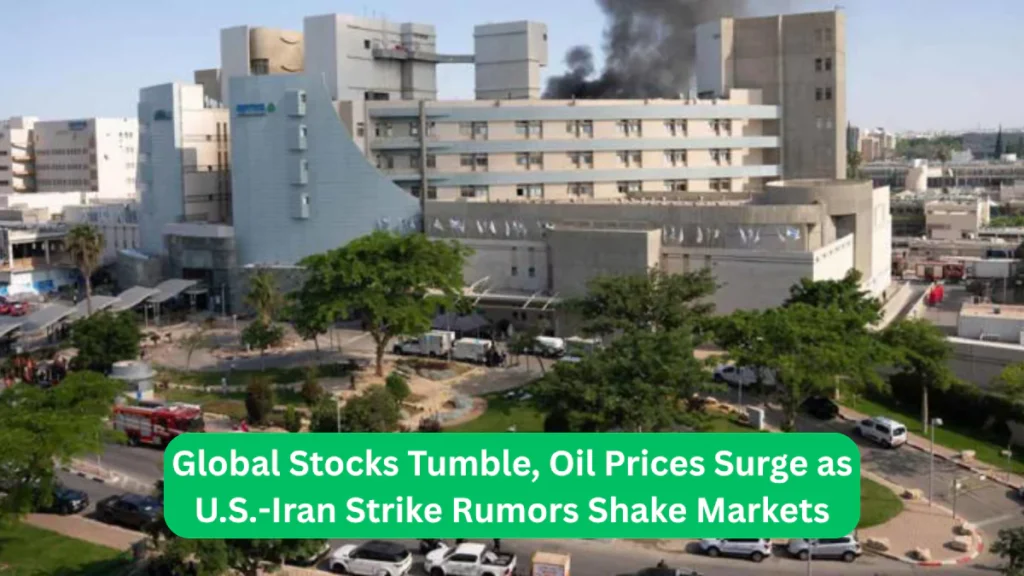Global Stocks Tumble, Oil Prices Surge as U.S.-Iran Strike Rumors Shake Markets
Global financial markets faced a sharp jolt on Thursday as reports surfaced that the United States might launch a military strike against Iran as early as this weekend, escalating tensions in the Middle East. Asian and European stock indices slid, while oil futures jumped, reflecting fears of disrupted energy supplies. Brent crude surged over 5% to hover near $74 per barrel, and safe-haven assets like gold and the U.S. dollar gained traction. This article dives into the market turmoil, the potential economic fallout, and what investors can do to navigate the uncertainty.

Market Reaction: Stocks Slide, Oil Spikes
The prospect of a U.S. strike on Iran, reported by MarketWatch, triggered a risk-off sentiment across global markets. Key developments include:
- Stock Markets: Asian indices, including Japan’s Nikkei and Hong Kong’s Hang Seng, fell over 1%, while European markets like the UK’s FTSE 100 dropped 0.4% to 1%, per The Guardian. U.S. futures signaled a weak open, with S&P 500 futures down 1.1%, Dow futures off 1.1%, and Nasdaq futures shedding 1.4%, per CBS News.
- Oil Prices: Brent crude futures rose 5.7% to $73.29 per barrel, while West Texas Intermediate (WTI) climbed 7.3% to $72.91, per CBS News and The Guardian. Earlier spikes saw Brent soar over 10%, per The Guardian.
- Safe Havens: Gold prices edged up 1% to near $3,425 per ounce, approaching a two-month high, while the U.S. dollar index rose 0.5% to 98.16, per Reuters and Yahoo Finance.
The market moves reflect heightened fears of a broader Middle East conflict, particularly given Iran’s control over the Strait of Hormuz, through which a fifth of global oil flows, per The New York Times.
Geopolitical Context: U.S.-Iran Tensions Escalate
The reported U.S. strike plans follow a series of tit-for-tat attacks between Israel and Iran, with Israel launching airstrikes on Iranian nuclear and military facilities on June 13, 2025, per Reuters and Yahoo Finance. Iran retaliated with missile strikes on Tel Aviv and Jerusalem, intensifying the conflict, per Reuters. U.S. President Donald Trump, in a Truth Social post, urged Iran to negotiate a nuclear deal to avoid further escalation, warning, “JUST DO IT, BEFORE IT IS TOO LATE,” per Yahoo Finance.
X posts, such as @Reuters’ updates, reflect ongoing market jitters, with stocks falling and oil rising as the Israel-Iran conflict entered its fifth day by June 17, 2025. However, these posts are inconclusive, and earlier claims like @sentdefender’s October 2024 note on U.S.-Israel discussions about striking Iran’s oil industry highlight persistent tensions, per X sentiment.
Economic Implications: Oil Shock and Inflation Fears
A potential U.S. strike on Iran, a major OPEC producer, could disrupt its oil exports, which account for 6% of its economy and primarily go to China, per The New York Times. Analysts warn of severe consequences:
- Oil Supply Risks: A blockade of the Strait of Hormuz could double oil prices to $130 per barrel, per UniCredit’s risk scenario cited in The Guardian. Even a limited disruption of Iran’s supply might push Brent to $75–$80, per UniCredit.
- Inflation Surge: Higher oil prices could reverse U.S. progress on inflation, which eased to 2.4% annually in May 2025, per CBS News. Mohamed El-Erian, Allianz economic advisor, flagged a “stagflationary shock” risk, per The Guardian.
- Global Impact: Europe and China, reliant on Middle East oil, face greater exposure than the U.S., which benefits from domestic fracking, per The New York Times. However, sustained high energy costs could hit U.S. consumers and businesses, per JPMorgan analysts cited in CBS News.
The Federal Reserve, facing a Wednesday decision on interest rates, may adopt a hawkish stance if oil-driven inflation persists, per Reuters. U.S. 10-year Treasury yields rose 5.6 basis points to 4.413%, reflecting market unease, per Yahoo Finance.
Sector Impacts: Winners and Losers
The market turmoil produced clear sector trends:
- Energy Stocks: The S&P 500 Energy Select ETF (XLE) gained over 1%, with oil companies benefiting from higher crude prices, per Yahoo Finance.
- Defense Stocks: Lockheed Martin (+3.3%), RTX Corporation (+2.2%), and Northrop Grumman (+3.2%) rallied on conflict escalation, per The Guardian.
- Airlines and Cruise Lines: Stocks fell sharply due to rising fuel costs, with carriers already grappling with trade tensions and weaker bookings, per Yahoo Finance.
- Gold and Crypto: Gold futures rose 1.3% to $3,450.50 per ounce, while bitcoin partially recovered to $105,000 after a dip, per Yahoo Finance. Crypto faced “mechanical de-risking” due to macro volatility, per DYOR’s Ben Kurland cited in CNBC.
These shifts highlight the flight-to-safety dynamic, with investors favoring commodities and defensive sectors, per Reuters.
Investor Sentiment: Caution with Opportunities
Despite the sell-off, some analysts see potential:
- Buying Opportunity: Wells Fargo’s Sameer Samana suggested long-term investors could capitalize on U.S. large-cap stocks and commodities, per Reuters. JPMorgan’s Andrew Tyler noted pullbacks as buying chances if U.S. involvement remains limited, per Yahoo Finance.
- Risk-Off Stance: RBC Capital Markets warned that a sustained oil price spike could trigger an S&P 500 plunge due to inflation pressures, per Yahoo Finance.
- Mixed Sentiment: The American Association of Individual Investors’ survey showed 33.6% bearish sentiment, down from 41.4%, with 36.7% bullish and 29.7% neutral, per CNBC.
X posts, like @Reuters’ June 19 note on investor fears of U.S. involvement, reflect heightened caution, though sentiment remains inconclusive without broader confirmation.
Signs of De-Escalation: A Glimmer of Hope
By June 17, 2025, markets showed signs of stabilizing as reports emerged that Iran might seek to de-escalate via nuclear talks, per Yahoo Finance and The Wall Street Journal. Brent crude slid below $73 per barrel, and the S&P 500 rebounded, per Yahoo Finance. However, Israeli Prime Minister Benjamin Netanyahu’s vow to continue strikes and Iran’s threats of a “major blow” keep risks alive, per Yahoo Finance and Mehr News Agency.
What Investors Can Do
Navigating this volatility requires a strategic approach:
- Diversify Portfolio: Allocate to safe havens like gold or U.S. Treasuries and consider energy stocks for potential gains, per Yahoo Finance.
- Monitor Oil Prices: Track Brent and WTI futures for inflation cues, as prices above $80 could signal broader economic strain, per UniCredit in The Guardian.
- Stay Informed: Follow trusted sources like cnbc.com, reuters.com, or @Reuters on X for real-time updates on U.S.-Iran developments.
- Consult Advisors: Work with financial planners to adjust risk exposure, especially if nearing retirement or heavily invested in equities.
- Avoid Panic Selling: Historical geopolitical shocks often have fleeting market impacts unless oil flows are severely disrupted, per The New York Times.
A Tense Moment for Markets
The June 19, 2025, report of a potential U.S. strike on Iran sent global stocks tumbling, with the S&P 500 futures down 1.1% and Brent crude surging 5.7% to $73.29 per barrel. While fears of a Strait of Hormuz blockade or doubled oil prices loom, de-escalation signals and U.S. energy independence offer some relief. Energy and defense stocks thrive, but airlines and equities face pressure amid inflation worries. As the Federal Reserve eyes rates and investors weigh safe havens like gold, staying informed and diversified is key. With Iran signaling nuclear talks, markets may find calm, but vigilance remains essential in this high-stakes geopolitical climate.
Disclaimer: This article is for informational purposes only and not financial advice. Consult a certified financial advisor for personalized guidance. Data is based on reliable sources, including MarketWatch, Reuters, and The New York Times. Market conditions may change; verify with official sources. msn.com is a news aggregator and not directly affiliated with the reported events.
Also Read: How Much Money Do Americans in Their 40s Have in Their 401(k)s in 2025?
Dodgers-Padres Brawl Ignites 2025 Rivalry: Tatis Jr. Hit, Ohtani Targeted, Managers Tossed





